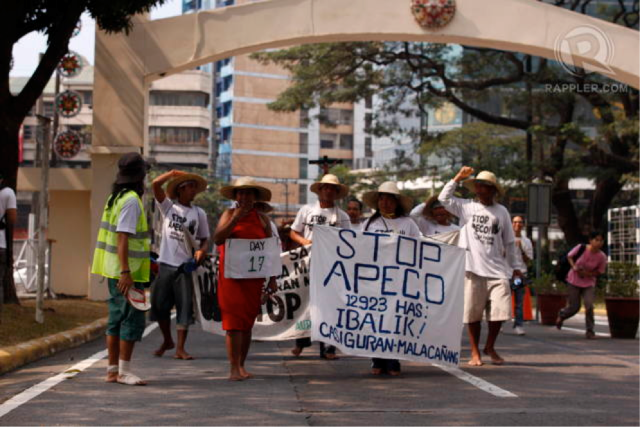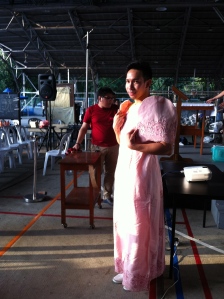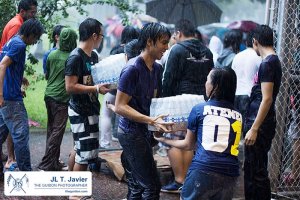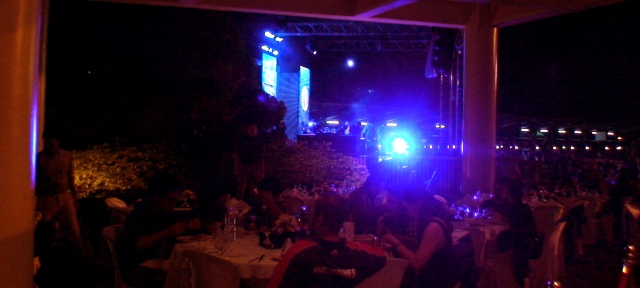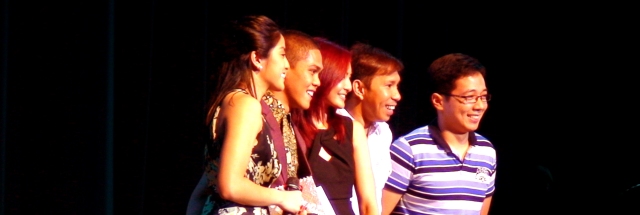The Year-End Review
School year 2012-2013 was an eventful year filled filled with twists and turns. The year was fraught with tension as the Reproductive Health Bill caused great divides. Success stories were also present in Ateneo’s achievements in the UAAP, leading to not just one, but two Bonfire celebrations. Even the day-to-day life of the average student was eventful as outages, policy changes, and political events came from outside the classroom. From controversial conflicts to narratives of hope, here’s our top events of the year.
(View our interactive timeline here.)
Ateneo holds relief operations for Habagat victims
(August 8 – 11, 2012)
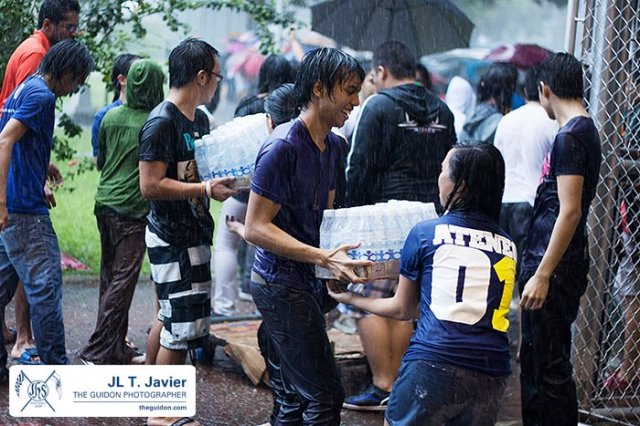
Volunteers pass cases of bottled water in an assembly line despite the torrential rains. Photo by John Lorenzo Javier (Guidon)
In the wake of the torrential rains of Habagat, the Ateneo Disaster Response and Management (DReAM) Team hold relief operations in the covered courts.
The efforts produced at least 13,000 family packs composed of food, toiletries, clothes, and medicines.
Read more on the story here.
Ateneo professors endorse RH Bill
(August 13, 2012)
160 faculty members of Ateneo signed a document expressing their endorsement of House Bill 4244, otherwise known as the Reproductive Health (RH) Bill. According to Interaksyon, the number of signatories later increased to 192.
University President Jose Villarin released an official letter on August 20, saying the Ateneo de Manila University as an institution, backs the Church against the RH Bill and urges its professors to teach the Catholic stand on the issue.
Regarding the professors who supported the RH Bill, the letter said, “Though the University must differ from their position for the reasons stated above, I appreciate their social compassion and intellectual efforts, and urge them to continue in their discernment of the common good. As there is a spectrum of views on this ethical and public policy issue, I ask all those who are engaged in the Christian formation of our students to ensure that the Catholic position on this matter continues to be taught in our classes, as we have always done.”
Varsitarian article causes online uproar
(September 30, 2012)
The Varsitarian, University of Santo Tomas’ official student publication, released an editorial that called professors of Ateneo de Manila University (ADMU) and De La Salle University (DLSU), “lemons,” “cowards,” and “interlopers.”
The article criticized several professors in both ADMU and DLSU for publicly supportingthe Reproductive Health Bill, despite being “Catholic” institutions.
The article sparked an outrage on social networking sites, prompting many to change their profile pictures to lemons, as a sarcastic expression of their disapproval with the article.
The wide-scale online reaction would later repeat itself in October when several Facebook users changed their profile pictures black in protest of the Cybercrime Prevention Act.
Read more on other online fads and trends in the university here.
UST Coach Pido Jarencio says refs are biased
(Oct 6, 2012)

ADMU Blue Eagles Coach Black (left) and UST Growling Tigers Coach Jarencio (right) go through some friction over the UAAP finals. Photo by Jerome Ascano (Spin.ph)
In the heat of the UAAP men’s basketball finals, UST Growling Tigers coach Alfredo “Pido” Jarencio made remarks that may have crossed the line.
According to InterAksyon’s transcript of a post-game interview with Jarencio, the UST coach complained that the referee’s were making faulty calls. He also complained they were making calls in favor of Ateneo.
“Kailangan ba mag-e-English ako para paburan ako? Ganun ba labanan dito? Hindi totoo. Nasa Pilipinas tayo dapat tayong mga Pilipino mahalin niyang mga iyan.” (Do I need to speak English for them to favor me? Is that how contests go here? Not at all. We’re in the Philippines, Filipinos should be favored here.)
The comment sparked the anger of ADMU Blue Eagles coach Norman Black, saying the comment was racist, according to a report on Spin.ph. “As a coach, you demean the game and the league when you say that you lost because of the referees. I think he’s just making excuses,”Black said.
Spin.ph later reported Jarencio shrugged Black’s statements.
Blue Eagles complete historic “Drive for Five,” Cement hoops dynasty
(Oct 11, 2012)

Norman Black steered Ateneo to 5 titles in 8 seasons at the helm. Photo by Mike Taboy (Abante-Tonite Online)
The Ateneo Blue Eagles defeated the UST Growling Tigers, 65-62, in Game Two of their best-of-three Season 75 UAAP Men’s Basketball Championships. The series sweep earns Ateneo its fifth-consecutive seniors’ title, and their first in school history.
Graduating power forward and back-to-back Finals MVP, Nico Salva, becomes the first player in collegiate basketball to win five-straight championships in as many years with his university. With the successful “Drive for Five”, Coach Norman Black concludes his eight-year tenure at Ateneo as only the second head coach to win five-straight titles, next to the legendary Baby Dalupan.
Read more on the story here.
Senator Trillanes at Café Philosophique
(December 7, 2012)
Re-electionist Sen. Antonio Trillanes IV (Nacionalista) went to Ateneo Assembly’s Café Philosophique on December 7, 2012 where he gave an informal talk on his views on current issues and his plans when he is re-elected.
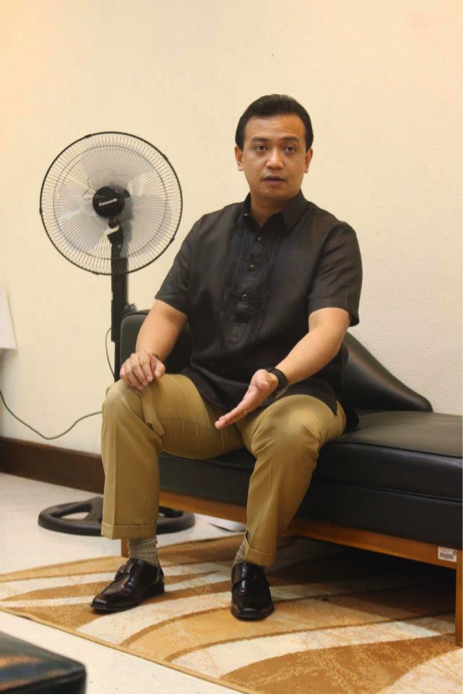
Senator Antonio “Sonny” Trillanes IV giving a talk at Ateneo Assembly’s Café Philosophique. Photo by Rucha Lim
Ateneans’ Pride March photo goes viral
(December 10, 2012)
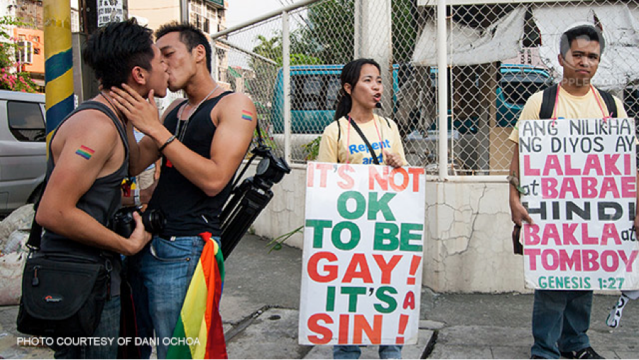
Jake Jereza (right) and his boyfriend Bardo Wu (left) kiss during a Pride March photo in front of some protesters. Photo by Dani Ochoa
Proving a little controversy goes a long way, Jake Jereza and Bardo Wu’s photo went viral, gaining hundreds of likes and shares within a few hours after Jereza made it his profile picture on Facebook.
The photo was taken on December 8, at the 2012 Metro Manila Pride March that took place in Makati City.
As of posting, the photo has 2001 likes and has been shared 839 times.
Jake Jereza’s fame would later get him to be the speaker at Ateneo Peers’ Sexuality Talk in Januray and the School of Social Sciences’ (SOSS) LGBT forum. in Febrauary for SOSS week.
Casiguran Marchers Go to Ateneo
(Dec 10-11, 2012)
In an 18-day march, 120 farmers from Casiguran, Aurora protesting against the implementation of the Aurora Pacific Economic Zone arrived at the Ateneo de Manila University grounds to rally for support for their cause.
Supported by the Ateneo Anti-APECO Task Force, the farmers stayed in the campus where they were welcomed and visited by Cardinal Tagle. The next day they were supposed to proceed to Malacanang but the President came to Ateneo where a dialogue was held at the San Jose Seminary.
They went back to Casiguran after a few days after they garnered pledges from different government offices. The fight is still not over, they say.
Read more here.
Theology professor resigns over RH Bill
(Dec 29, 2012)
Professor Rafael Dy-Liacco resigned his teaching position and tenure in the theology department near the end of December.
According to CBCP news, Dy-Liacco resigned because he could no longer take the large pro-RH movement in Ateneo. Dy-Liacco believed students no longer sought counsel from the Roman Catholic Church and as a teacher, he believed this conflicted with his role as a teacher of Catholic theology.
A survey by Ateneo Statistics Circle for the Guidon the year before revealed a majority of Ateneans supported the RH bill.
Amidst great divisiveness, the RH Bill passed its final reading on December 17 and was signed into law on December 21, 2012 as Republic Act 10354.
Power outage in Rizal library
(Feb 20, 2013)
On the same day Ateneo holds its yearly fire drill, the New Rizal library experiences a power outage. Many students thought the power outage was part of the fire drill and exited the library, thinking they were following protocol.
The power outage was caused by a minor explosion in one of the powerhouses at the back of the library.
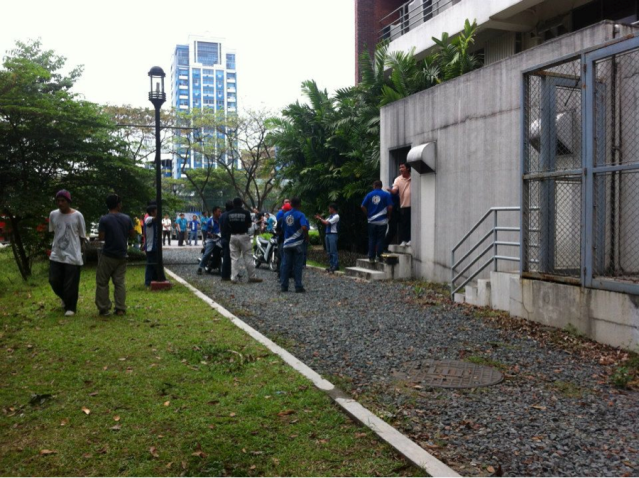
Loyola Schools Maintenance working on one of the powerhouses at the back of the New Rizal Library. Photo by Rucha Lim
The library resumed operations later that afternoon.
Sabay sa Bayan: 2012 Senatorial Forum
(February 8, 2013)
Several senatoriables went to Ateneo for a forum where they each pitched why they should be voted for. They were also asked questions from both the panel and hand-picked questions from the audience.
The senatoriables that went were Rep. Teodoro Casiño (Independent), Paolo Benigno Aquino IV (Liberal Party), Grace Poe-Llamanzares (Independent), Christian Señeres (Democratic Party of the Philippines), John Carlos de los Reyes (Ang Kapatiran), and Ernesto Maceda (UNA).
The event was hosted by journalist, Arnold Clavio and student Antonia Potenciano, 4 AB COM.
Rep. Sonny Angara (LABAN) was reported to have refused the invitation to the event though this remains unconfirmed.
The New Kings of Katipunan: Blue Booters dethrone UP for Football Title
(February 24, 2013)

The Blue Booters win Ateneo’s first title in seven seasons. Photo by Soccer Central Philippines.
The Ateneo Blue Booters emerge victorious, 4-2, from a thrilling penalty shootout versus defending champion University of the Philippines-Diliman, in Game Two of their Season 75 UAAP Men’s Football Championships. Bolstered by a core of blue-chip recruits, Ateneo breezed through the first round of eliminations, undefeated. In the semi-finals, the Blue Booters marched on to the championship round via a 4-3 drubbing of De La Salle on penalties.
Behind the heroics of Yu Murayama, Ateneo’s finals sweep of the “Battle of Katipunan” marked the end of UP-Diliman’s two-year reign as men’s football titleholders. The Blue Booters bagged a slew of individual accolades, including Mikko Mabanag for Best Midfielder, Fil-Italian Carlo Liay for Rookie of the Year, and fellow newcomer Nick O’Donnell for both Best Goalkeeper and Most Valuable Player.
Ateneo’s first seniors’ football championship after the 2003 to 2005 “Three-Peat,” came in the inaugural year of the Moro Lorenzo Field.
Read more on this story here.
Owning the Diamond: Blue Batters score first championship
(February 27, 2013)
In a rematch of last year’s finals, the Ateneo Blue Batters blanked the National University Bulldogs, 4-0, in Game Three of their UAAP Baseball Championship. Ateneo drew first blood in Game One, 6-2. Game Two saw NU levelling the series with a high scoring, 9-8 win.
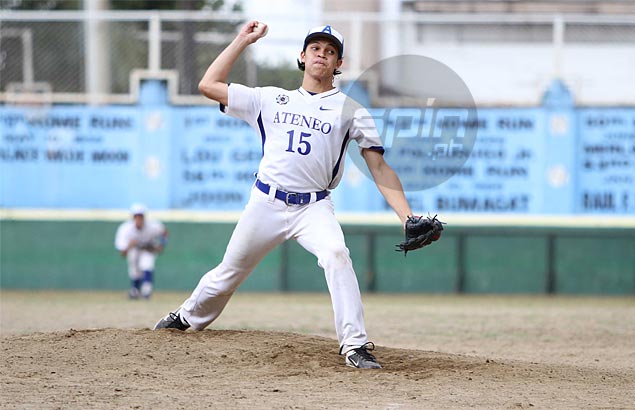
Rookie Miguel Salud threw a series-high 144 pitches. Photo by Jerome Ascano (Spin.ph).
In the do-or-die encounter, 18-year- old rookie pitcher Miguel Salud commanded the mound, stranding 13 Bulldog batters, striking out six, while only yielding seven hits. Veteran Matt Laurel delivered an all-around performance, hammering two home-runs, two hits and two Runs-Batted-In. Salud and Laurel, both named co-MVP’s of the series, towed Ateneo to its first-ever seniors’ baseball championship. It was the school’s first since joining the UAAP back in 1978.
Read more on this story here.
Townhall: PPCRV – Solar News Senatorial Series
(March 6, 2013)

The senatorial candidates showing their individual before the official photo op session. Photo by Rucha Lim
Ateneo hosted the Parish Pastoral Council for Responsible Voting (PPCRV)-Solar News series, Townhall. Senatorial candidates pitched why they should be voted for and were also questioned by the panel and selected students from Ateneo and Assumption College.
The senatoriables that went were Rizalito David (Ang Kapatiran), Greco Belgica (Democratic Party of the Philippines), Ramon Montaño (Independent), JV Ejercito (United Nationalist Alliance), Miguel Zubiri (United Nationalist Alliance), Mitos Magsaysay (United Nationalist Alliance).
The event was hosted by Pia Hontiveros and PPCRV Media and Communications director Ana de Villa Singson.
Lady Eagles valiant in defeat to DLSU Spikers
(March 6, 2013)
From a novelty sport to centrepiece attraction, Season 75 saw the unprecedented rise of women’s volleyball to new heights. At the forefront were the Ateneo Lady Eagles, bannered by the “Fab Five” of veterans Gretchen Ho, Fille Cainglet, Jem Ferrer, Dzi Gervacio,and Aillysse Nacachi.
The statuesque volleybelles fought their way into the finals for the second consecutive season, faced with the two-time defending champions, the DLSU Lady Spikers. The Lady Eagles were defeated after a three-set game, the first two of which owed to a mere three-to-five-point discrepancy. The third set had both sides tie four times, until after the Lady Spikers began the scoring spree that led to victory.
Nonetheless, the Lady Eagles have duly incited Ateneo pride, being among the most prominent representatives of volleyball in a national scale. Their indisputable appeal to the public ranges in reason from their evidently exceptional skills to their compelling drive, and on occasion to their aesthetic laudability.
Related news: Lady Eagle Gretchen Ho would later host the Athelete’s Night Awards. Read the story here.
One-way traffic scheme implemented
(Feb 11, 2013)
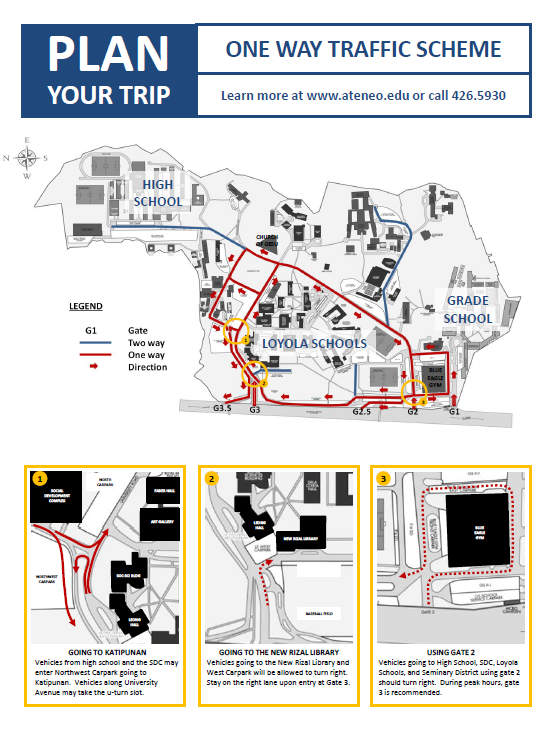
Ateneo’s new one-way traffic route implemented. Image from ADMU website.
In an effort to reduce traffic in Ateneo, the university launched a one-way traffic scheme that was implemented on Feb 11, 2013.
The new system was accompanied by the launch of a shuttle system using electronic jeeps. Read more on the story here.
Prior to its implementation, the university put up standees of various university personalities endorsing the new system. Some of these included Unviersity president Jose Villarin, men’s basketball player, Kiefer Ravena, women’s volleyball player Gretchen Ho, and philosophy professor Eduardo Calasanz among many others.


